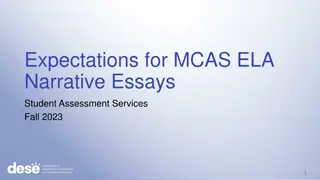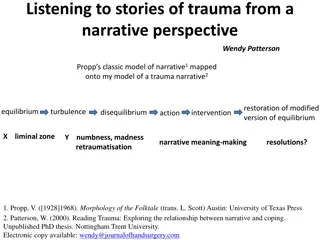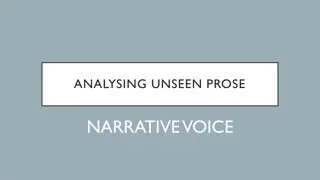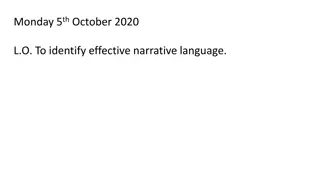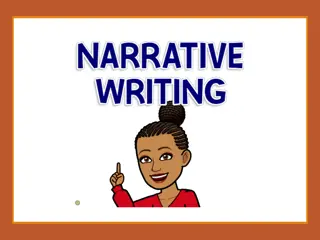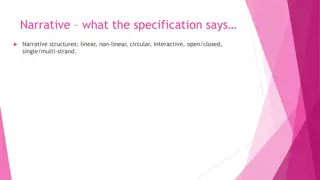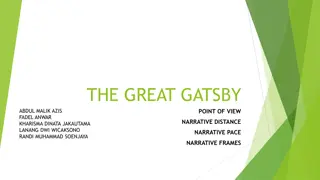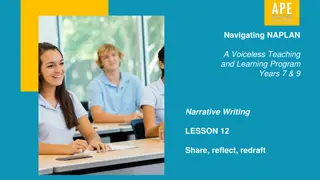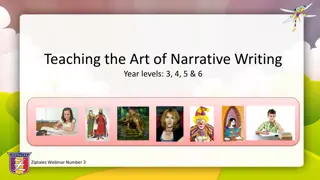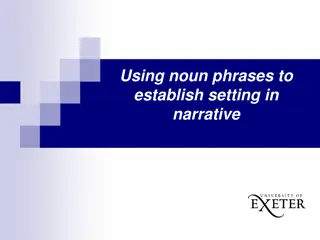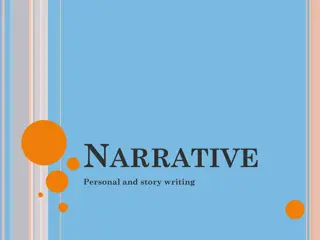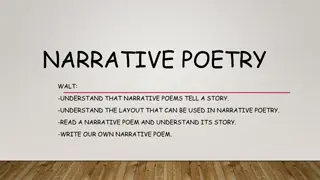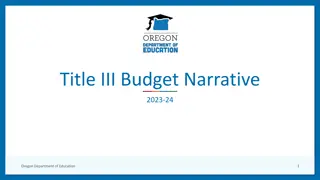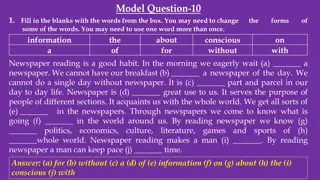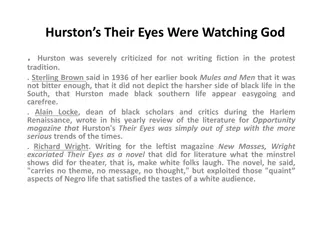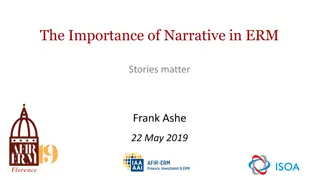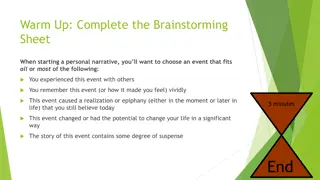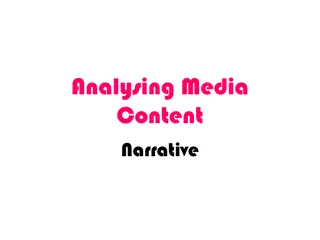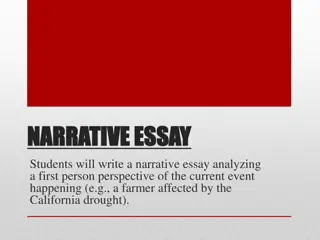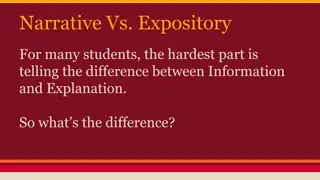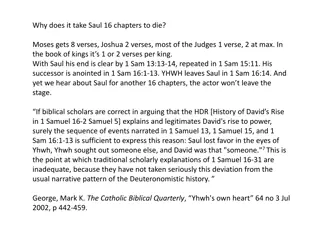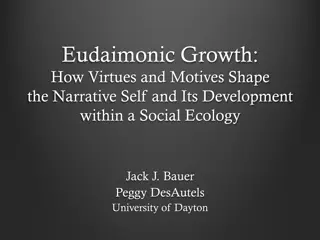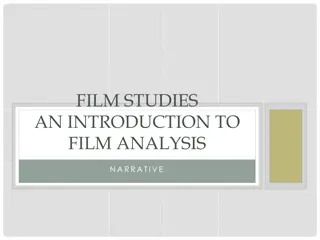Language Study Community – Enhance Your Language Skills
Joining a Language Study Group is a fantastic way to take your language learning to the next level. By leveraging the power of Group Study, you can immerse yourself in the language, enhance your understanding, and build confidence in your speaking abilities. Read full article \/\/explainlearning.com
1 views • 3 slides
Academic Language Demands and Supports in Instructional Planning
Academic Language Demands and Supports are crucial in educational settings to ensure comprehension and usage of language by students. This content discusses embedding language demands in lesson plans, providing language supports, and peer review activities to enhance academic language skills. The fo
6 views • 10 slides
The Significance of Media in Language Learning
Media plays a crucial role in language learning by raising awareness of the ideology behind linguistic structures and providing valuable information on society and culture. Linguists are drawn to media language for research purposes and to understand its impact on language use and attitudes. Media s
12 views • 5 slides
Understanding Translation: Key Concepts and Definitions
Translation involves transferring written text from one language to another, while interpreting deals with oral communication. Etymologically, the term "translation" comes from Latin meaning "to carry over." It is a process of replacing an original text with another in a different language. Translat
11 views • 76 slides
MCAS ELA Narrative Essay Expectations and Examples
Learn about the expectations for MCAS ELA narrative essays, including guidelines for idea development and conventions. Find out how to score well by responding in the correct writing mode and avoiding common mistakes. Explore examples of lower-score responses and how to improve them. Download sample
3 views • 10 slides
Understanding Trauma Narratives: A Narrative Perspective
Exploring trauma narratives through the lens of Wendy Patterson Propp's classic narrative model, this study delves into the restoration of equilibrium, the disruption of disequilibrium, and the intervention actions within the liminal zones of trauma narratives. It emphasizes narrative meaning-making
5 views • 5 slides
Understanding Narrative Perspective in Unseen Prose Narratives
Explore the narrative voice in unseen prose narratives through the analysis of different narrative perspectives, such as homodiegetic and heterodiegetic narrators. Understanding these terms helps in interpreting the impact of perspective on storytelling and themes in literary texts for exam preparat
1 views • 17 slides
Exploring Effective Narrative Language for Writing Success
Delve into the art of crafting compelling narratives by identifying and utilizing effective narrative language techniques. Explore the elements that make a good narrative, practice identifying literary techniques, and understand the impact of figurative language on storytelling. Enhance your writing
0 views • 42 slides
Exercise in Narrative Style Transformation
Practice transforming narrative styles in storytelling through a series of examples where dialogues are rewritten into narratives. The exercises focus on changing direct speech into indirect speech while maintaining the essence of the original conversations. Each task presents a scenario followed by
1 views • 26 slides
Mastering Narrative Writing: Techniques and Sequences
Enhance your narrative writing skills by engaging readers with compelling characters and settings, developing well-structured event sequences, and utilizing descriptive details and narrative techniques effectively. Explore different points of view and learn to create engaging narratives that captiva
1 views • 23 slides
Understanding Narrative Research Design in Qualitative Research
Narrative research is a qualitative research approach that focuses on sharing individuals' stories. Researchers collect and interpret personal narratives to understand individual experiences. Key characteristics, data collection methods, steps, and ethical considerations in narrative research are ex
0 views • 20 slides
Understanding Narrative Structures in Media: Linear vs. Non-Linear
Explore the concepts of linear and non-linear narrative structures in media storytelling, analyzing how they are used to engage audiences effectively. Dive into well-known stories like Alice in Wonderland, Hansel and Gretel, and Jack and the Beanstalk to understand the difference between narrative a
0 views • 17 slides
Understanding Narrative Elements in "The Great Gatsby
Explore the narrative elements in "The Great Gatsby" such as point of view, narrative distance, and narrative pace. The novel is analyzed from chapters 5 to 9, focusing on Nick Carraway's first-person perspective and the small narrative distance, which adds realism to the story.
0 views • 11 slides
Enhancing Language Learning Across the Curriculum in B.Ed. 1st Year Course
Language Across the Curriculum (LAC) emphasizes that language learning should occur across all subjects, not just in language classrooms. It highlights the importance of incorporating language development into every learning activity, fostering multilingualism in schools. Language plays a crucial ro
2 views • 34 slides
Understanding Narrative Techniques for Effective Storytelling
Explore different narrative techniques like first-person perspective, flashback, framed narrative, foreshadowing, and in medias res to enhance your storytelling skills. Learn how these techniques can bring depth and complexity to your narratives, captivating your audience with engaging storytelling
3 views • 13 slides
Understanding the Art of the Short Story
A short story is a concise narrative that captivates readers with a focused theme and structured plot. This literary form demands unity of purpose and a single informing idea, distinguishing it from a novel. Various perspectives exist on the composition of a short story, with debates on its length,
1 views • 10 slides
NAPLAN Year 7 & 9 Narrative Writing Lesson: Share, Reflect, Redraft
Explore a voiceless teaching program for NAPLAN Years 7 & 9 narrative writing in Lesson 12. Dive into assessment criteria, NAPLAN minimum standards for Year 7 and 9, and resources from the National Assessment Program. Enhance your narrative writing skills through sharing, reflection, and redrafting.
0 views • 5 slides
Mastering Narrative Writing: Tips for Year Levels 3-6
Dive into the art of narrative writing focusing on Year Levels 3 to 6. Explore the importance of narratives in children's lives, the inclusion of narrative in the Australian Curriculum, understanding what truly constitutes a story, and engaging activities to spark creativity in students.
0 views • 25 slides
Understanding Narrative Stories and Plot Structure
A narrative text is a story composed of various elements such as characters, setting, conflict, events, climax, and resolution. The structure of a narrative story can be dissected into parts like beginning, middle, and end, each serving a specific purpose in storytelling. By plotting the story on a
0 views • 13 slides
Speech and Language Developmental Milestones: A Bilingual/Multilingual Perspective
Speech and language developmental milestones are crucial for children, regardless of their home language. These milestones encompass receptive language, expressive language, pragmatics, and articulation and phonology. Understanding how a child hears and talks from birth to one year is essential, as
1 views • 23 slides
Exploring Setting Through Noun Phrases in Narrative Descriptions
Establishing setting in narrative through the use of descriptive noun phrases is crucial for creating a vivid and immersive atmosphere. By carefully selecting and arranging nouns, authors can evoke specific moods and engage readers in a detailed visual experience. This approach enhances the overall
1 views • 6 slides
Intriguing Narrative Journey
The session explores narrative writing, correcting sentences into past tense, discussing opening lines, successful narrative ingredients, and a gripping excerpt. Engage with the power of storytelling and honing writing skills through creative challenges and analysis.
0 views • 73 slides
Mastering Narrative Writing: Techniques and Tips
Dive into the world of narrative writing with this comprehensive guide! Learn the nuances of crafting fictional and personal stories, explore dialogue techniques, understand the structure of a narrative, and enhance your writing with impactful vocabulary. Whether you're a beginner or seeking to refi
0 views • 20 slides
Dive into Narrative Poetry
Explore the essence of narrative poetry by understanding its storytelling nature, layout, features, and common poetry techniques. Delve into an example poem, "Skippy the Naughty Kangaroo," to grasp the main characters, narrative elements, and the story it conveys. Through this journey, you'll enhanc
0 views • 11 slides
Budget Narrative for Title III Grants in Oregon Education 2023-24
This budget narrative outlines the goals of Title III grants for the Oregon Department of Education, focusing on aiding English learners in attaining language proficiency and academic achievement. It emphasizes the importance of Supplement not Supplant regulations to ensure proper fund allocation an
0 views • 38 slides
Enhancing Language Skills Through Practice
Improve your language skills with a variety of exercises including filling in blanks, sentence formation, verb usage, and narrative style transformation. Enhance your grammar, vocabulary, and narrative abilities while engaging with these interactive language tasks.
0 views • 13 slides
The Complexity of Narrative Voices in "Their Eyes Were Watching God
Zora Neale Hurston's novel "Their Eyes Were Watching God" faced criticism for not conforming to traditional protest literature styles. The narrative features a compelling protagonist, Janie Crawford, who defies stereotypes of black women in literature. Hurston skillfully employs a dual narrative sty
0 views • 8 slides
Introduction to Language Technologies at Jožef Stefan International Postgraduate School
This module on Knowledge Technologies at Jožef Stefan International Postgraduate School explores various aspects of Language Technologies, including Computational Linguistics, Natural Language Processing, and Human Language Technologies. The course covers computer processing of natural language, ap
0 views • 27 slides
Exploring Sociolinguistics: Language Variation and Social Factors
Sociolinguistics delves into the study of language variation influenced by social factors, examining the relationship between language and its social context. It explores various aspects like standard pronunciation, language choice, speech acts, language components, language variety, and factors suc
0 views • 73 slides
Understanding Assembly Language Programming for Computing Layers
Assembly language is a low-level programming language that enables direct interaction with a computer's hardware components. This content explores the fundamentals of assembly language, the relationship between human-readable machine language and binary code, an assembly language program for multipl
0 views • 31 slides
The Power of Narrative in ERM and Economics
Narrative plays a crucial role in risk management, as it helps in better understanding and decision-making. The use of stories in risk dashboards and economic narratives can convey complex information effectively. Robert Shiller's concept of narrative economics explores how popular stories impact ec
0 views • 27 slides
Personal Narrative Brainstorming for Engaging Storytelling
Start your personal narrative journey by selecting an event that resonates with significant aspects of personal experience and emotional impact. Explore shared experiences, vivid memories, realizations, potential life-changing moments, and elements of suspense to craft a compelling story. Engage in
0 views • 26 slides
Understanding Language Anxiety in Foreign Language Learning and Teaching
Explore the impact of language anxiety on students and teachers in foreign language learning and teaching contexts through insights from Dr. Christina Gkonou's research. Delve into the theoretical background, implications for language education, and real-life experiences shared at the Essex Language
0 views • 25 slides
Engaging Narrative Writing Challenges for Year Six Students
Delve into a captivating narrative featuring Louisa, Miss Larkin, and Mr. Spencer. Explore the use of figurative language, relative clauses, and emotive language in a mysterious and dramatic setting. Follow the challenges outlined to enhance your storytelling skills with similes, personification, me
0 views • 6 slides
Understanding Narrative Structures in Media Content
Narrative in media content involves how stories are told, focusing on structure and conventions. Key elements include Todorov's narrative theory, basic narrative structures, and Propp's character spheres of action, all of which shape the way stories unfold in films and other media.
0 views • 13 slides
Crafting a First-Person Perspective Narrative Essay
Explore the art of crafting a narrative essay from a first-person perspective, delving into the essence of storytelling through vivid details and character reflections on current events. Learn narrative techniques and guidelines for structuring compelling narratives, all through the lens of personal
0 views • 31 slides
Understanding the Difference Between Narrative and Expository Writing
Differentiating between narrative and expository writing can be challenging for many students. This content explores the distinctions between narrative stories like "Little Red Riding Hood" and expository pieces, touching on concepts such as the shapes of stories and the structure of essays. Quotes
0 views • 8 slides
Saul's Prolonged Narrative in 1 Samuel: A Deviation Explained
Exploring the extended narrative of Saul in the book of 1 Samuel compared to other biblical figures, this analysis delves into the theological and narrative reasons behind Saul's prolonged story. It examines the implications of Yhwh's abandonment of Saul and the emergence of David as the chosen one,
0 views • 8 slides
Understanding Eudaimonic Growth and the Narrative Self
Delve into how virtues and motives influence the development of the narrative self within a social context. Explore the interplay between eudaimonic values, virtues, and the impact of families and social institutions on personal growth. Discover the significance of narrative self-construction in sha
0 views • 23 slides
Exploring Narrative in Film Studies: An Introduction to Film Analysis
Shots in film and television are crucial in storytelling, forming the narrative that can be dissected into plot and discourse. The plot revolves around events and character development, while discourse focuses on how the story is conveyed. Narrative theory, highlighted by Propp's character roles, pr
1 views • 11 slides




